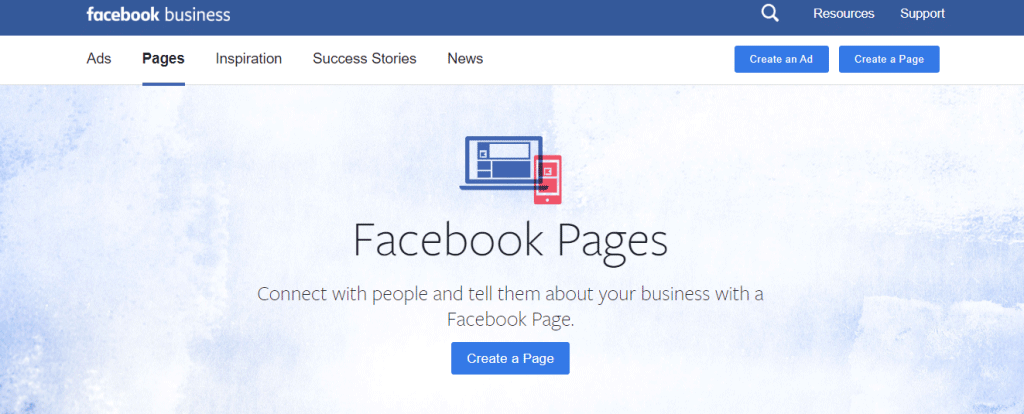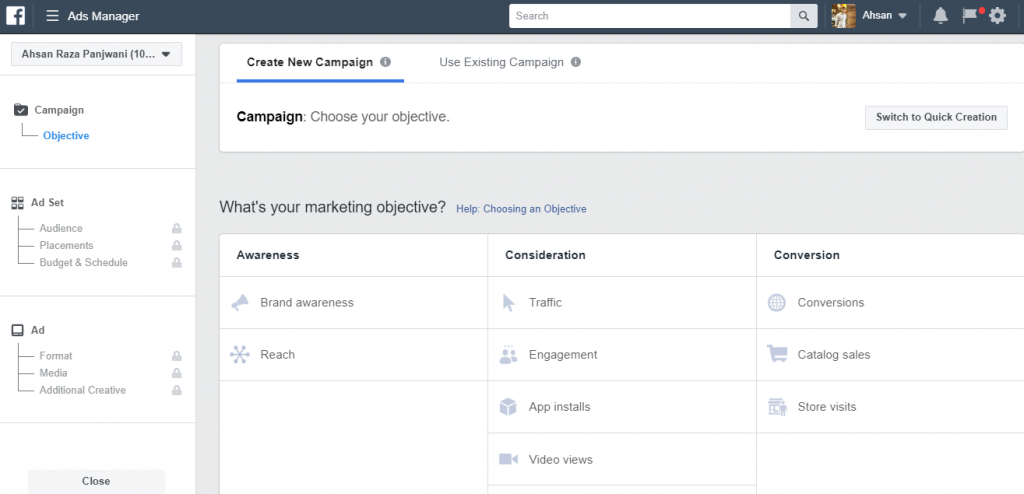Want to use Facebook for affiliate marketing? This blog will serve as a brief guide for online marketers on how to leverage the Big Blue.
Facebook is big and everybody knows that!
Developed by a Harvard student Mark Zuckerberg in 2004, Facebook is now the largest social media network in the world. In 2012, Facebook had surpassed the 1 billion mark.
As of the second quarter of 2018, Facebook had a whopping 2.23 billion monthly active users. That’s almost a third of humanity!
As an affiliate marketer on Facebook, you simply cannot afford to ignore the world’s largest social media channel. Whether you are promoting web hosting or running shoes, there’s an audience for almost all kinds of products and services on Facebook.
Let’s Get Started with Facebook for Affiliate Marketing!
When using Facebook for affiliate marketing, the first thing to do is to create your own page. This is very simple!
From the drop-down menu on the right, choose ‘Advertising on Facebook’. From the ‘Pages’ tab, click the ‘Create a Page’ button.

You will then have to enter a few relevant details and you will be good to go!
A Facebook page allows you to create an authentic presence. As a page owner, you also get access to a lot of insights. These insights typically focus on three key areas. They are: page likes, post reach and engagement. What’s more, you can track followers, page views and video statistics.
As an affiliate marketer, a good strategy would be to choose a theme or topic that you are passionate about and promote relevant products. For instance, if you are a fitness freak, a good idea would be to promote products and services related to lifestyle and fitness. You can promote deals and discounts. Having said that, the key to success would be relevant and high-quality content. Your audience is more likely to trust you if they find what you have to say useful.
Improving SEO for Your Facebook Page
Although SEO is a term generally linked to Google, you will have to take steps to improve it when using Facebook for affiliate marketing. Here are some of them:
- Once the number of your Facebook ‘Likes’ reaches 25, you can claim the vanity URL for your Facebook page. Vanity URL is a shortened, more readable version of the original URL. It is also easy for the search engine to recognize your brand. Here’s an example:
Original URL: http://www.facebook.com/pages/Equine-Calculator/857469375913?ref=ts
Vanity URL: http://www.facebook.com/EquineCalculator
- Getting backlinking is also a crucial part of SEO. Continue working to get links from prominent, well-respected pages.
- When writing status updates, make sure you are using your relevant keywords. Google prefers the keyword in the first few words. You can also add a link to your affiliate website in the post.
- Do note that ‘Facebook Notes’ rank well on search engines. They are great for promoting special events or offers.
Getting Organic Likes
When it comes to leveraging Facebook for affiliate marketing, getting that blue thumbs up is very important. Buying ‘Likes’ and increasing that number to impress people would not do the trick.
You as an affiliate marketer will have to be organic in your approach. This means that your page likes should not just be a number, it should be something more substantial. You want people, real people, to like your page. They must like your content and want to share it with their friends and followers.
To start with, send an email to your list letting them know that you have created a Facebook page. Ask them to check it out. In the call-to-action, tell them if they want more updates from you, they would have to ‘like’ your page. However, do this tactfully. You do not want to sound too pushy.
Actively Engaging with Fans
Just getting likes is not enough, you also need to engage with your fans on a regular basis. Post too much and your audience will be annoyed by you. Post too little and there’s a high chance you will be forgotten on the busy Facebook. You need to find just the right balance.
Typically, one to four posts a week works fine, depending on how content-heavy they are. For instance, if you are publishing entertainment related posts, you will need to keep the frequency high. On the other hand, share heavy content like videos or articles once a week.
User attention spans are at an all-time low. This means that you should focus on visual. According to an infographic by Neil Patel, photos get 53 percent more likes, 104 percent more comments and 84 percent more click-throughs.
A ratio of 80-20 works best when employing Facebook for affiliate marketing. This means that 80 percent of your posts should be entertaining or educational, whereas, 20 percent of them can be targeted promotions.
You can also create games and quizzes. People love them! The idea is to build rapport with your audience and then provide value through your products or services.
Promoting Through Facebook Groups
From WordPress to food, there is a Facebook group for virtually everything. People are passionate about stuff. They want to find like-minded people and discuss their interests with them.
Find a group that is relevant in your niche and contribute to it. However, there’s a caveat here. You can’t just promote your links on these groups. If you do that, you will be ousted as a spam.
Winning on Facebook group requires time and patience. You need to promote as organically as possible using social media best practices. Here are a few quick tips to keep in mind when posting on Facebook groups:
- Look to stir interesting conversations.
- Never post the same thing on multiple groups at the same time:
- Do not tell people to ‘inbox’ you. If you have a valuable suggestion for them, post it.
Leveraging Influencers
Social listening is keeping track of the digital conversations happening on the web to understand what your audience is talking about. It allows you to know your audience’s pain points and take actions accordingly.
Social listening is also a great way to find social influencers in your niche. Influencers are impactful personalities who people turn to for advice. They have a great number of followers and many likes, shares and comments on their posts.
Although there are quite a few social listening tools available, you will not need any when using Facebook for affiliate marketing. Let’s say you build WordPress websites. The best way to find influencers would be through WordPress groups. All you have to do is type ‘WordPress Groups’ in the search bar and you will have a list of top groups.

Typically, influencers in the field are either moderators in these groups or the ones with the highest number of engagements.
You need to Identify these influencers and establish a ‘like-like’ relationship. It helps if they have liked your page. Like their page. Engage with their posts. Follow them on other platforms such as Twitter and Instagram.
Once you have built rapport, it’s time to hit them on Facebook messenger. Establish mutual benefits. Show them what’s in it for them. You might have to contact a few influencers before you find the right ones for your niche.
Employing Facebook Ads
Facebook ads should be a key part of your strategy when using Facebook for affiliate marketing. According to a study by eMarketer, 96 percent of social media marketers consider Facebook ads the most effective paid advertising channel on the social network.
And why wouldn’t it be? Billions of people see Facebook ads each month.
Unlike YouTube that disrupts user experience by showing ads in the middle of the video, Facebook integrates ads seamless in users’ News Feeds. They are shown ads relevant to their interest while they watch their friend’s cute baby’s first smile.
Go to ‘Advertising on Facebook’ and click ‘Create an Ad’. Facebook Ads Manager will appear.

Depending on what you want to achieve from the ad, choose a goal from Awareness, Consideration or Conversion. For instance, if you want to increase your page likes, Engagement should be your choice. On the other hand, if your goal is to direct people to your Squeeze page for collecting opt-in email addresses, Conversion would be a more suitable choice.
Facebook will then ask you questions regarding Audience, Placements and Budget and Schedule. Answering these questions will help you customize your ads.
Finally, you will have to add creatives to your ads. This will include your ad copy and images. Make sure that your copy resonates with the audience and use only high-quality images.
To start with, you can spend $25 to $50 and target one city. Depending on the results, you can then expand your campaigns.
One thing to remember here is that Facebook Ads should complement your other affiliate marketing efforts on Facebook. You should keep working on creating organic engagements by producing and promoting high-quality content.
3 Expert Tips on Using Facebook for Affiliate Marketing
We at Cloudways reached out to people with real experience of success using Facebook for affiliate marketing. We think their insights will be quite helpful. Read on:
Nate Materson, CMO at Maple Holistics
On Facebook Ads:
“If you want a faff-free way of driving promotions and campaigns, it’s worth spending money on Facebook Ads. Even if you don’t make money from it straight away, it provides great insight on how to market on the platform. Use it as a method to collect data and draw conclusions on your customer base”.
Hung Nguyen, Marketing and Customer Satisfaction Manager at Smallpdf
On Having a Dedicated Affiliate Landing Page:
“Have your affiliate landing page ready. Be clear and concise as to what the benefits for affiliate partners are. For SaaS especially, if you can offer a free or test account for affiliate partners to play around with your product. Your affiliate partners are people at the end of the day. You’d want them not only to be driven to promote your product by monetary means but also because they love and appreciate the product. This way, they would be happy to promote your product over time”.
Deborah Sweeney, CEO at MyCorporation
On Building Relationships:
“Small businesses often do not have a huge marketing budget. We have found that building partnerships, affiliate relationships and cross-referrals can be one of the best ways to grow a business. Facebook and Twitter have great marketing benefits, but, more than that, to even be considered relevant, you need to get your business a Facebook and/or Twitter account. A website is where your customers go to find out what they need to know about your business, and social media is where customers go to find out about who you are as a business; what your voice sounds like”.
To Sum Up
Facebook is the leading social media platform for affiliate marketers. From joining groups in your niche to leveraging Facebook ads, there are many ways affiliate marketers can use Facebook to their advantage.
Remember that affiliate marketing on Facebook should complement your marketing on other channels. The world’s largest social media platform will give you that edge. It will take time and patience, but if you persist you will see the results for yourself.
We at Business scan24 wish you best of luck for your affiliate marketing endeavors on Facebook.
Let us know if you found this article helpful. We would like to hear your struggles or success stories when using Facebook for affiliate marketing!

No comments:
Post a Comment